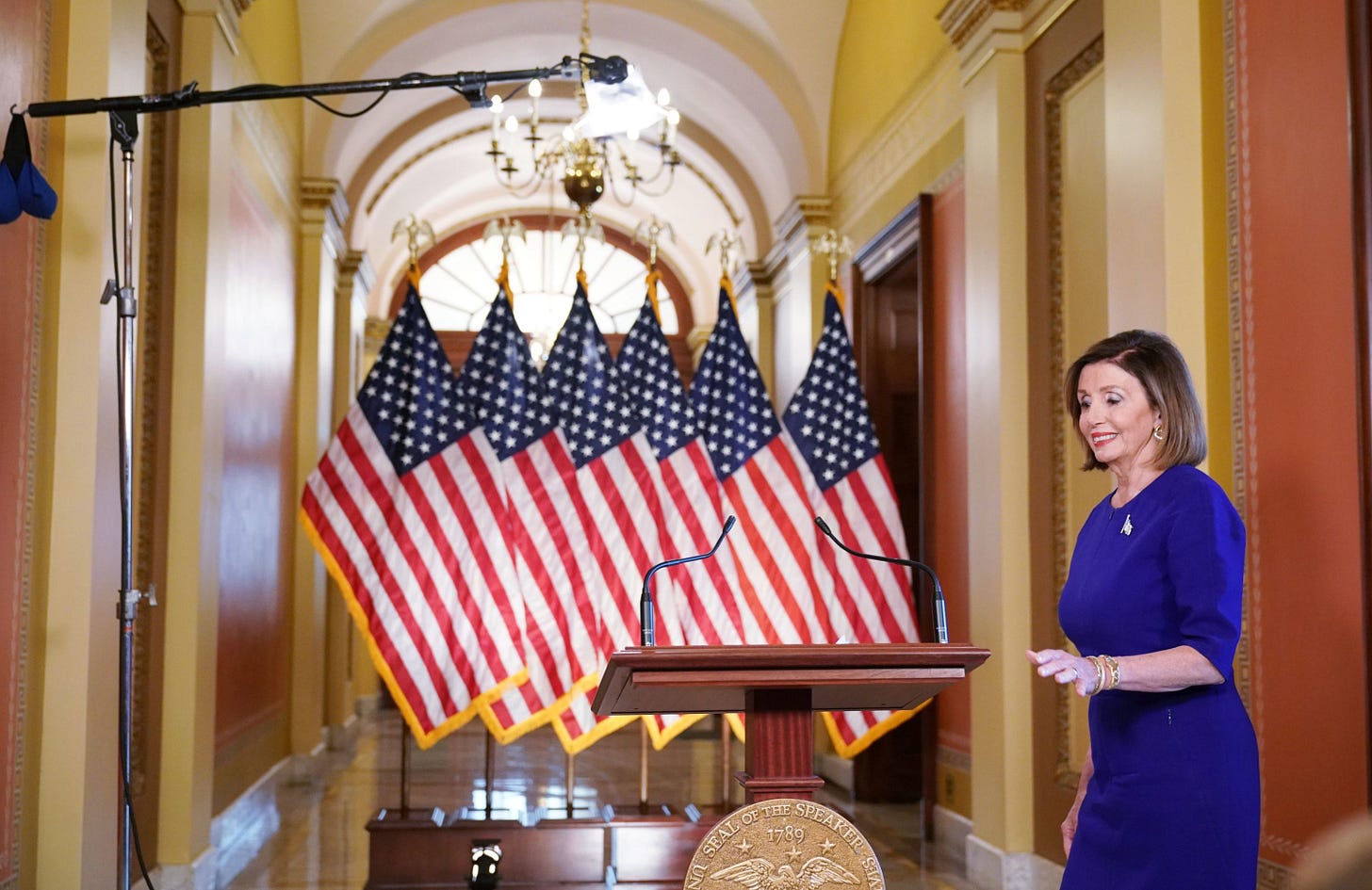Impeachment Is a Symptom of Runaway Presidential Power, Not the Answer
Sean Trende recently noted that impeachment has been invoked more frequently in recent decades: in 1974*, 1998, and now in 2019. The only previous impeachment was against Andrew Johnson in 1868. So we went more than 100 years without trying to remove a president, and now we’re trying to do it roughly every 20 years. That certainly indicates an increased level and intensity of conflict between Congress and the executive.
Trende goes on to suggest that this could be beneficial and have the effect of weakening the power of the presidency. I have a lot of respect for Trende, but I disagree, and I think he’s getting the cause and effect backward. The incentive for impeachment has become more urgent precisely because the presidency has been getting stronger—and because nobody really wants to rein it in.
The more important a prize the presidency represents, the more viciously we fight over it.
This is not to dismiss the merits of this particular impeachment inquiry. From what we’ve seen so far, Donald Trump’s phone call with the president of Ukraine is a clear abuse of presidential power and, perhaps worse, shows a president in the grip of Russian conspiracy theories.
But neither the other impeachment attempts nor this one have had the function or intent of reducing presidential power and clawing back the authority of Congress. Their intent has simply been to remove one particularly pernicious individual from the office that exercises executive power.
Remember the spirit behind all of these impeachment inquiries: In all three cases, the party out of power had suffered an especially bitter election loss (1972, 1996, 2016) and was in no mood to accept the winner. I remember that the dominant mood among Republicans during the Clinton impeachment scandal was not sorrow or outrage, but glee—a delirious joy that they had found the blue dress and finally gotten the goods on Slick Willy.
Since Trump took office, Democrats have clearly been looking for evidence of impeachable misconduct. The fact that they actually seem to have found something is Trump’s fault—and totally predictable. But impeachment is not a way of limiting the powers of the president.
It’s a substitute for limiting those powers.
If Congress really wanted to rein in the presidency, for example, it could take back the power given to it in Article I, Section 8 of the Constitution: “The Congress shall have power to lay and collect taxes, duties, imposts, and excises.” As it is, Congress has abdicated power over tariffs to the executive, and Donald Trump has been gleefully imposing them to prosecute his disastrous trade war. The effect is that the president has unilaterally imposed tens of billions of dollars in new taxes on the American people, usurping the role of Congress. Members of Congress could remove his authorization to do so, if they wanted.
One of the craziest parts of this impeachment push is that Democrats show no signs of wanting to limit presidential power on any issue. In fact, their own presidential candidates have been competing over who can promise to do more by executive order on day one of his or her administration, from banning guns to breaking up Facebook. What Democrats are saying is that they want a super-all-powerful president—just not this guy.
Hence the imperative for impeachment that begins on the day he takes office. If you’re going to invest the president with near total power and relentlessly shift authority from Congress to the executive, then what role does Congress play? How can it rein in the president or influence him? All it has left is the impeachment power.
Impeachment is not, as some of the president’s defenders have been screaming, an attempt by Congress to stage a “coup” to remove a duly-elected president between elections. It is the way the Constitution provided for Congress to remove a duly elected president between elections, without the need for a coup, if his misconduct rises to a level they believe requires it.
Yet impeachment is the most extreme remedy in the Constitution and its invocation is a demonstration that things have already gone terribly wrong. We might want to ask what some of those things are.
One is that the presidency has been endowed with far too much power at the expense of the constitutional role of Congress. Giving the president more power gives him more power to abuse—and it attracts the sort of hyper-ambitious strongman who lusts after unchecked authority.
During this whole donnybrook—or after it—we should take the time to fix that. Maybe we can reduce the chance that we will have to go through another wrenching impeachment battle twenty years from now.
*Yes, politics geeks, I know that Richard Nixon was never actually impeached. But he resigned when it became clear that he would be impeached and convicted, so this counts.


